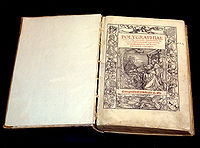
Official Wikipedia App for Android. Wikipedia is the free encyclopedia containing more than 32 million articles in 280 languages, and is the most comprehensive and widely used reference work humans have ever compiled.
Features:
- Lead images: experience Wikipedia like never before with a prominent, contextually-relevant image and description at the top of articles
- Image gallery: tapping on an image shows you the image full-screen in high resolution, with options to swipe left/right for browsing additional images.
- Descriptions from Wikidata: when searching, each search result now contains a quick description that helps to contextualize the result. These descriptions are also shown in Nearby results, Read More suggestions, and disambiguation links.
- Article suggestions: scroll to the bottom of an article to see suggestions about what you could read next
- Speed: Our native app is the fastest way to use Wikipedia on your mobile device
- Editing: You can edit Wikipedia! Logged in or logged out, we thank you for all your contributions.
- Saved pages: You can save select pages for offline reading and browse them even when you don't have a data connection.
- Nearby: Learn more about what's around you by getting links to articles about things that are near your current location.
- Language support: The app allows you to seamlessly switch to reading Wikipedia written in any language.
- Table of contents: Swipe left on any article to bring up the table of contents, which lets you jump to article sections easily
- Wikipedia Zero: Data charges waived for participating mobile operators.
Send us your feedback about the app! In the menu, press "More", then "About the Wikipedia app", then "Send app feedback".
The code is 100% open source. If you have experience with Java and the Android SDK, then we look forward to your pull requests!
https://github.com/wikimedia/apps-android-wikipediaPrivacy policy:
http://wikimediafoundation.org/wiki/Privacy_policyTerms of Use:
http://wikimediafoundation.org/wiki/Terms_of_Use




